牛津上海版七年级英语上册《Unit2 Our animal Vocabulary》课件
文档属性
| 名称 | 牛津上海版七年级英语上册《Unit2 Our animal Vocabulary》课件 |

|
|
| 格式 | zip | ||
| 文件大小 | 138.7KB | ||
| 资源类型 | 教案 | ||
| 版本资源 | 牛津上海版(试用本) | ||
| 科目 | 英语 | ||
| 更新时间 | 2015-10-28 09:53:09 | ||
图片预览

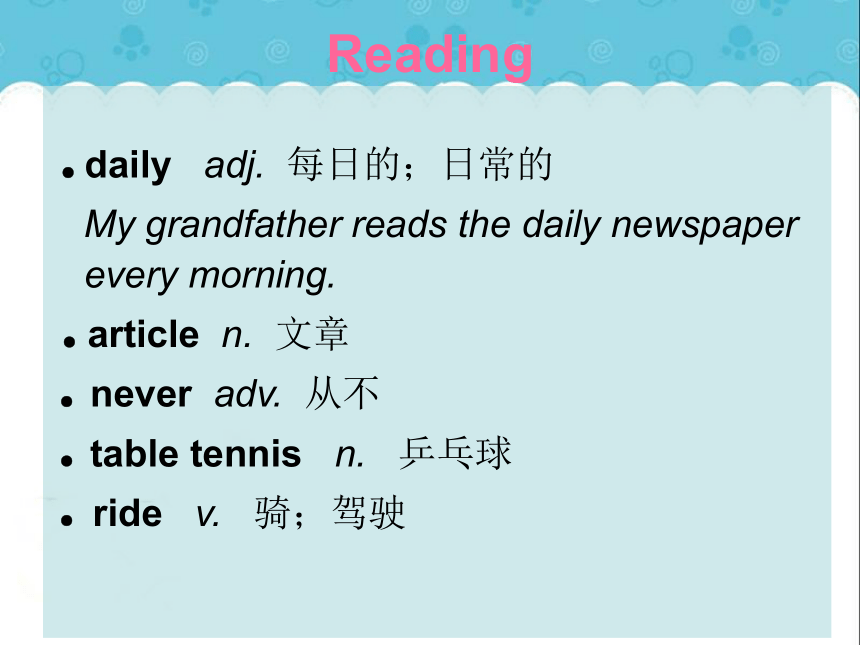
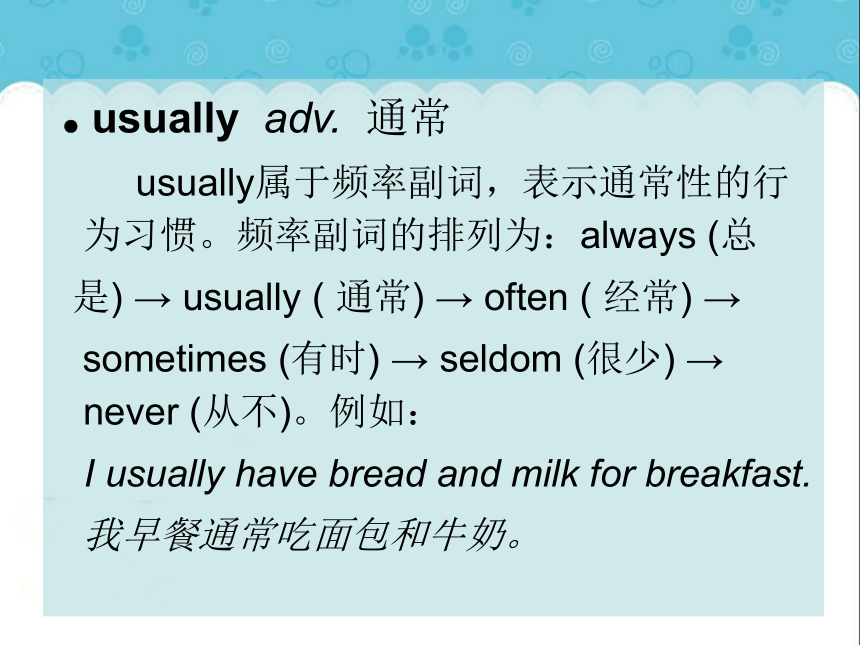

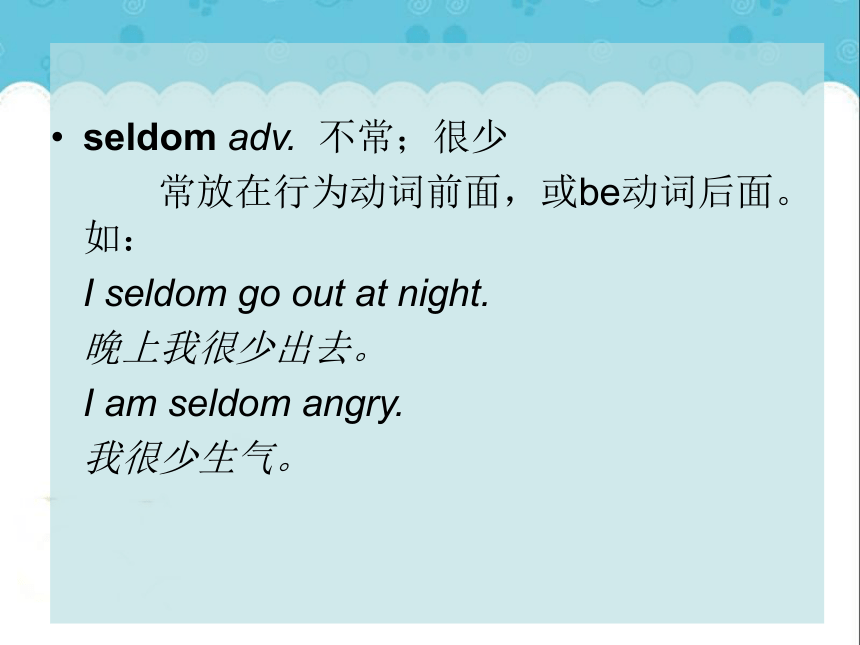
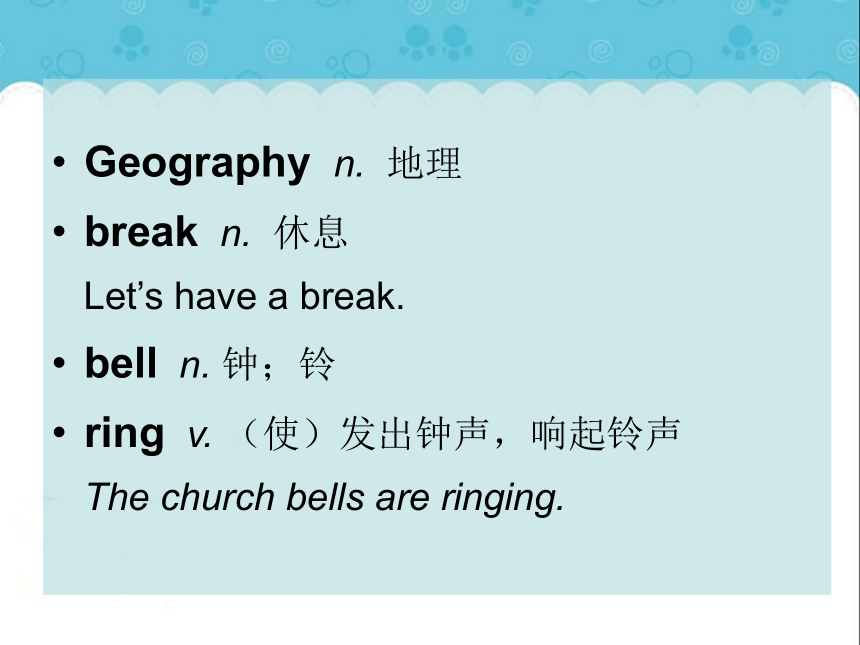
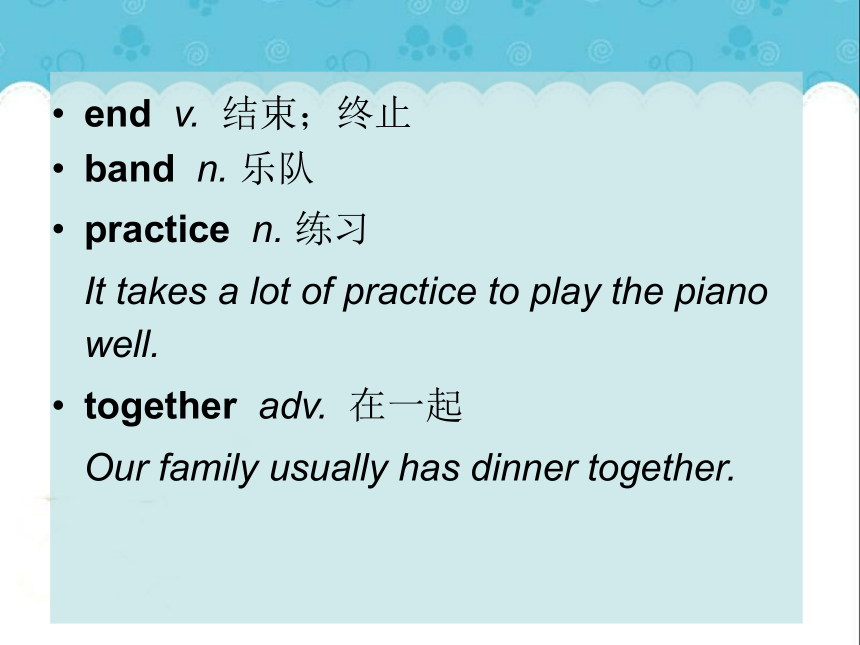
文档简介
课件17张PPT。Unit 2 Our animal friends
VocabularyModule 1 RelationshipsReading ● daily adj. 每日的;日常的
My grandfather reads the daily newspaper every morning.
● article n. 文章
● never adv. 从不
● table tennis n. 乒乓球
● ride v. 骑;驾驶 ● usually adv. 通常
usually属于频率副词,表示通常性的行为习惯。频率副词的排列为:always (总
是) → usually ( 通常) → often ( 经常) →
sometimes (有时) → seldom (很少) → never (从不)。例如:
I usually have bread and milk for breakfast.
我早餐通常吃面包和牛奶。● so conj. 因此;所以
在连接表示原因和结果的两个句子时,so后面的句子表示结果, 与前面表示原因的句子往往用逗号分开。如:
I was tired, so I went to bed early last night.
我昨晚很累,所以很早就去睡觉了。
Alice is a friendly girl, so we all like her.
爱丽丝是一个很友好的女孩,所以我们都喜欢她。
seldom adv. 不常;很少
常放在行为动词前面,或be动词后面。如:
I seldom go out at night.
晚上我很少出去。
I am seldom angry.
我很少生气。
Geography n. 地理
break n. 休息
Let’s have a break.
bell n. 钟;铃
ring v. (使)发出钟声,响起铃声
The church bells are ringing.
end v. 结束;终止
band n. 乐队
practice n. 练习
It takes a lot of practice to play the piano well.
together adv. 在一起
Our family usually has dinner together.
● junior high school 初级中学
I liked watching football match in?junior
high school.
● on foot 步行
常见的出行方式还有:by bus, by car, by taxi, by underground, by train, by plane, by ship 等。
● have a good time 过得愉快
Did you have a good time in Hong Kong last month?take part in 参加
take part in指参加群众性活动、会议、劳动、游行等,往往指参加者持有积极的态度。有时可与join in互换使用。
Will you take part in the English evening?你会参加英语晚会吗?
We should take an active part in school activities.
我们应该积极参加学校的活动。 Listening ~ Writing● market n. 集市;市场
We buy fruit and vegetables at the market.
● guitar n. 吉他
He is good at playing the guitar.
● grade n. 年级
● go to bed 去睡觉
● get up 起床
动词第三人称单数的发音规则☆ 大多数动词在词尾加“s”,在清辅音后“s”读
/s/,在浊辅音及元音后读/z/。如:
stop → stops /s/; make → makes /s/;
read → reads /z/; play → plays /z/
☆ 以辅音字母加“y”结尾的动词,要先将“y”变为“i”,然后加“es”,读/z/。如:
fly → flies /z/; study → studies /z/
☆ 以“s, x, ch, sh”结尾的动词,在词尾加“es”,读/Iz/。如:
teach → teaches /Iz/; watch → watches /Iz/
☆ 以“o”结尾的动词,在词尾加“es”,读/z/。如:go → goes /z/
do 和say 两个动词变为第三人称单数的形式后,元音部分的发音发生了较大的变化。
do /du:/ → does /d?z/;
say /seI/ → says /sez/注意1. The meeting will last for two hours. It will
e______ at four o’clock.
2. We often have a ten-minute b______
between two classes.
3. There is a m______ near my home. My
mother goes shopping there every day.
4. I like the rock b______. They sing very
well.Exercise 1 根据首字母提示完成下列句子。ndreakarketand5. We should be in the classroom for a
lesson when the bell r______.
6. He couldn’t understand the story,
s______ he came to ask me for help.
7. My mother is very busy every day. Afterwork, she has to do all the d______
housework.
8. Tobby is n______ late for school.ingsoailyever1. 昨天我过得很开心,因为我见到了很多老
朋友。
I _____ _____ _____ _____ yesterday because I met a lot of old friends.
2.初中的课程不算太难。
The subjects in _____ _____ _____ are not very difficult.Exercise 2根据中文意思完成句子。had a good timejunior high school3. 我妈妈经常睡得晚,起得早。
My mother usually _____ _____ _____
late and _____ _____ early.
4. 明天我们有个聚会,你想来参加吗?
We will have a party tomorrow. Would
you like to _____ _____ _____ it?
5. 我长大后,父母就很少担心我了。
After I grow up, my parents are ______ worried about me.
goes to bedgets uptake part inseldom找出下列每组单词中划线部分读音与其他三项不
同的一项。
( )1. A. maps B. books C. shops D. bags
( )2. A. flowers B. sisters C. brothers D.months
( )3. A. shirts B. thanks C. cousins D. ships
( )4. A. goes B. watches C. wishes D.glasses
( )5. A. photos B. cakes C. radios D. eggsExercise 3DDCA B
VocabularyModule 1 RelationshipsReading ● daily adj. 每日的;日常的
My grandfather reads the daily newspaper every morning.
● article n. 文章
● never adv. 从不
● table tennis n. 乒乓球
● ride v. 骑;驾驶 ● usually adv. 通常
usually属于频率副词,表示通常性的行为习惯。频率副词的排列为:always (总
是) → usually ( 通常) → often ( 经常) →
sometimes (有时) → seldom (很少) → never (从不)。例如:
I usually have bread and milk for breakfast.
我早餐通常吃面包和牛奶。● so conj. 因此;所以
在连接表示原因和结果的两个句子时,so后面的句子表示结果, 与前面表示原因的句子往往用逗号分开。如:
I was tired, so I went to bed early last night.
我昨晚很累,所以很早就去睡觉了。
Alice is a friendly girl, so we all like her.
爱丽丝是一个很友好的女孩,所以我们都喜欢她。
seldom adv. 不常;很少
常放在行为动词前面,或be动词后面。如:
I seldom go out at night.
晚上我很少出去。
I am seldom angry.
我很少生气。
Geography n. 地理
break n. 休息
Let’s have a break.
bell n. 钟;铃
ring v. (使)发出钟声,响起铃声
The church bells are ringing.
end v. 结束;终止
band n. 乐队
practice n. 练习
It takes a lot of practice to play the piano well.
together adv. 在一起
Our family usually has dinner together.
● junior high school 初级中学
I liked watching football match in?junior
high school.
● on foot 步行
常见的出行方式还有:by bus, by car, by taxi, by underground, by train, by plane, by ship 等。
● have a good time 过得愉快
Did you have a good time in Hong Kong last month?take part in 参加
take part in指参加群众性活动、会议、劳动、游行等,往往指参加者持有积极的态度。有时可与join in互换使用。
Will you take part in the English evening?你会参加英语晚会吗?
We should take an active part in school activities.
我们应该积极参加学校的活动。 Listening ~ Writing● market n. 集市;市场
We buy fruit and vegetables at the market.
● guitar n. 吉他
He is good at playing the guitar.
● grade n. 年级
● go to bed 去睡觉
● get up 起床
动词第三人称单数的发音规则☆ 大多数动词在词尾加“s”,在清辅音后“s”读
/s/,在浊辅音及元音后读/z/。如:
stop → stops /s/; make → makes /s/;
read → reads /z/; play → plays /z/
☆ 以辅音字母加“y”结尾的动词,要先将“y”变为“i”,然后加“es”,读/z/。如:
fly → flies /z/; study → studies /z/
☆ 以“s, x, ch, sh”结尾的动词,在词尾加“es”,读/Iz/。如:
teach → teaches /Iz/; watch → watches /Iz/
☆ 以“o”结尾的动词,在词尾加“es”,读/z/。如:go → goes /z/
do 和say 两个动词变为第三人称单数的形式后,元音部分的发音发生了较大的变化。
do /du:/ → does /d?z/;
say /seI/ → says /sez/注意1. The meeting will last for two hours. It will
e______ at four o’clock.
2. We often have a ten-minute b______
between two classes.
3. There is a m______ near my home. My
mother goes shopping there every day.
4. I like the rock b______. They sing very
well.Exercise 1 根据首字母提示完成下列句子。ndreakarketand5. We should be in the classroom for a
lesson when the bell r______.
6. He couldn’t understand the story,
s______ he came to ask me for help.
7. My mother is very busy every day. Afterwork, she has to do all the d______
housework.
8. Tobby is n______ late for school.ingsoailyever1. 昨天我过得很开心,因为我见到了很多老
朋友。
I _____ _____ _____ _____ yesterday because I met a lot of old friends.
2.初中的课程不算太难。
The subjects in _____ _____ _____ are not very difficult.Exercise 2根据中文意思完成句子。had a good timejunior high school3. 我妈妈经常睡得晚,起得早。
My mother usually _____ _____ _____
late and _____ _____ early.
4. 明天我们有个聚会,你想来参加吗?
We will have a party tomorrow. Would
you like to _____ _____ _____ it?
5. 我长大后,父母就很少担心我了。
After I grow up, my parents are ______ worried about me.
goes to bedgets uptake part inseldom找出下列每组单词中划线部分读音与其他三项不
同的一项。
( )1. A. maps B. books C. shops D. bags
( )2. A. flowers B. sisters C. brothers D.months
( )3. A. shirts B. thanks C. cousins D. ships
( )4. A. goes B. watches C. wishes D.glasses
( )5. A. photos B. cakes C. radios D. eggsExercise 3DDCA B
同课章节目录
- Module 1 Relationships
- Unit 1 Relationships in beijing
- Unit 2 Our animal friends
- Unit 3 Friends from other countries
- Module 2 My Neighborhood
- Unit 4 Jobs people do
- Unit 5 Choosing a new flat
- Unit 6 Different places
- Unit 7 Signs around us
- Module 3 Diet and health
- Unit 8 Growing healthy,growing
- Unit 9 International Food Festival
- Unit 10 A birthday party
- Unit 11 My food project
